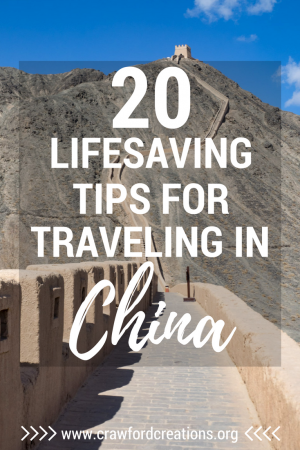20 Lifesaving Tips for Traveling in China
***This post may contain affiliate links.***
I’m not gonna like, China can be a bit of a daunting place. Especially for the first time traveler. But, don’t let that discourage you! China is host to countless hidden gems, amazing cultural experiences, and delicious food that you won’t want to miss out on.
Here are 20 China travel tips to help you navigate the language barrier, reduce culture shock, and experience the best China has to offer!
1) Don’t let the map fool you, Hong Kong, Macau, and Taiwan are NOT China.
Yes, technically they are considered a part of China as “special administrative regions”, but for the purpose of travel (speaking as an American citizen) you do NOT need a visa to enter Hong Kong, Macau, or Taiwan whereas you absolutely DO need one (and it’s a lengthy process at that) to enter Mainland China.
You will also need to go through customs crossing from a “special administrative region” to the mainland, each region has their own currency and governments (for now), and unlike in China, English is widely spoken, making it much easier to get around. But no worries, the following tips will help to prepare you for crossing the border into the mainland.

2) Do not expect people to speak English.
China has been an extremely closed off country for a long time, so until recently the Chinese had no reason to learn anything but, well, Chinese, which is actually made up of many different languages in itself. In fact, each region of China has its own language that is mutually unintelligible with all the other Chinese languages. Can you imagine having to learn up to 20 different languages just to travel around your own country? It’s no wonder up until recently people haven’t learned English.
Now that the government has made Mandarin the official language (meaning it is taught in all schools and is now the common language spoken throughout the country) and China has started opening up to the rest of the world, English is taught alongside Mandarin in schools.
However, despite now studying English for 10 years in school, most Chinese still can’t actually speak it, aside from maybe a few basic questions and answers memorized from a textbook. I can’t really blame them, unless they are one of the lucky few to be able to travel or study outside of China, or work for an international company, they never have the opportunity to actually speak it.

3) Download Pleco and Baidu Translate to help you communicate.
As previously mentioned, most Chinese don’t speak and have about zero understanding of, the English language. As a result, having these two apps on your phone will be a life saver when traveling around China. I seriously don’t know what I would do without them, and even now that I am conversationally fluent in Chinese I still use Pleco on a daily basis. So what are they?
Baidu Translate – Like Google translate, but better.
- Because it actually works in China without a VPN
- It churns out much more accurate translations than Google (speaking strictly about Chinese of course)
Pleco – A Chinese-English dictionary app for your phone.
For reals, this thing is my life saver. It gives you not only translations, but will speak the word out loud so you can hear how it’s pronounced, gives you a definition of each individual character within the word, provides you with other words that contain the word/character you looked up, and gives you a bunch of example sentences for how to use said word. If there was one Chinese language hack I would recommend, it would be this one.

4) Google and Facebook are blocked in China.
And when I say Google is blocked, I mean literally everything associated with the Google company: the Google search engine (obviously), g-mail, Google maps, YouTube, Google+, etc..
Why?
Because if you haven’t heard of it China has this thing in place called “The Great Firewall” meaning they have seized control over the World Wide Web in their country. The firewall does NOT apply to Hong Kong, Macau, or Taiwan (remember how I said they weren’t actually China?), but it is omnipresent over the mainland.
What’s the beef with Google?
The company refused to censor information to meet the demands of the Chinese government, thus, no more googling in China. You can still Bing, and Yahoo, and of course use the Chinese search engine Baidu, but depending on what you search you might not be getting all the information.
Google maps will still work however, but you will be surprised to find that everything in China is shifted around to be completely inaccurate. It’s usually not by that much, but just enough, that, for example, the intended address of your destination might be in the middle of a river. And trust me, you don’t want to be in the middle of a Chinese river, they’re gross.
No Facebook, really?
Yup. Too much sharing of information, information is power, power in the hands of the people, not so good for the Communist party (this is my take on it anyway).
How do we get around this?
Download a VPN – a handy dandy little program that when turned on tricks the internet into thinking your computer is in a different location. For example, when I turn mine one my I.P address can say for instance that I am in San Diego, California, USA, when in fact I am typing this from my computer in China. If you are ever in China for an extended period of time, I would definitely pay for one, unless you are a complete loner who wants to be disconnected from the world, in that case, party on with your big bad self.
We use VPN.AC to stay connected to our favorite social media, news sites, and search engines. As a smaller VPN company, we’ve found that VPN.AC tends to stay under the radar in China (which is an awesome thing), so while my friends using bigger name VPN companies have issues with China blocking their VPN or having a really slow connection, I am free to Google away to my heart’s content. Another bonus, it’s the cheapest of all the VPNs!

5) Your phone will not work in China.
China has its own separate phone companies that only service mainland China. Remember those pesky little special administrative regions I told you about earlier? Yea, my Chinese phone doesn’t work in Hong Kong, Macau, or Taiwan, even though they are technically a part of China, confused yet?
Literally, there are no Verizon Wireless or AT&T towers, etc. so your phone will pick up absolutely zero service or data. You can buy international data for your phone, but don’t expect it to be reliable in China. Justin’s U.S. phone with international data is very hit or miss when used in China.
6) Stick to the tourist traps.
This is usually the one thing I would never say, but, if you don’t speak Chinese, China is the exception. Tourist areas are where you will find the few English speakers, and where you will get the most information and direction on how to find cool places, for example, when we arrived at the bus station in Le Shan to see the Giant Buddha, there were signs saying “Bus to Buddha” and people shouting and pointing, “To Buddha!”, super easy.
This is not to say that you shouldn’t go for the off the beaten path adventures, there are some totally awesome ones in China for sure, but just beware without any language skills they will take a lot of patience, and require a much more adventurous traveler to enjoy.

7) Stay in international hostels, or known foreign brand hotels (i.e. Holiday Inn, Marriot,etc.).
Chinese brand hotels are very hit or miss. Yes, you might find a nice hotel for cheap and have no problems, but more often than not they will either be gross, and you don’t want to stay there, or, the staff there will not be equipped to handle foreigners, and, as what happened to us in Hainan, will call the police to figure out if they are allowed to house foreigners and for help to register them. It’s best to avoid this option if you don’t fancy getting questioned by the police and want a guaranteed nice place to stay.
By sticking to these international brand accommodations you will not only be guaranteed a decent place to stay, and staff knowledgeable on how to deal with foreign guests (because we are such a hassle, I know) but you will be gifted with staff members and fellow guests who are English speakers.
This means you can actually get help without the use of sign language, have knowledgeable staff to help you find your tourist attractions and tell you what all the best places in the area are to see, and how to get there, and have an abundance of fellow English-speaking travelers to make friends with and share tips and stories.
The best booking site we’ve found for hotels in China is Agoda. Agoda finds an amazing variety of hotels to choose from in China and explicitly states which hotels accept foreigners and which don’t, so you can make sure you will be accepted upon arrival. Hotels must be registered and approved by the Chinese government to accept foreigners, which means not all of them do! Book with Agoda and you’ll never have an issue.

8) Carry a business card from your hotel to show taxi drivers.
All businesses in China will have a business card with their name, address, and phone number, and sometimes even a map, for customers to take. Make sure to get one from your hotel or hostel, that way getting back to your hotel after an awesome day of sightseeing is as easy as getting in a taxi and showing the driver a business card. No stress or misunderstanding needed, just sit back and enjoy Mr. Toad’s wild ride that will be your journey home.
For your arrival from the airport, train station, etc. it also works to have the Chinese address of your hotel saved in your phone, or a pin on a map to show your driver.
9) Traffic patterns are chaotic, stay alert.
Technically, I’ve been told there are traffic rules in China, but trust me, as they are not at all enforced, it’s more like traffic suggestions, that no one uses, because if they did they would never get anywhere, and the Chinese like to get places in their cars, all sorts of crazy places. I’ve seen cars both driving and parked on the sidewalks and in bike lanes, driving the wrong way down the road (on a four-lane divided highway might I add) parked in the middle of the road, my list could go on and on.
The only traffic rule obeyed in China are the lights, everything else is a complete free-for-all. What that means for tourists is that pedestrians do NOT have the right of way and cars will not stop for you, not even if you are in a designated crosswalk (I’m not kidding, I’ve had cars actually speed up to try and cut in front of me). The right of way starts with the biggest vehicle on the road, down to the smallest car, then motorcycles/mopeds, then bicycles, and finally, pedestrians.

10) The Chinese have absolutely no clue how to queue.
Queuing (or standing in line as us Americans call it) in China is a bit like playing defense on a sports team. The Chinese will do their best to cut in front of you, even going as far as to physically push you out of the way, especially the grannies, don’t let them fool you, they are brutal, and the fact that they are little old grannies completely plays to their advantage because you will totally not see their attack coming. I definitely didn’t the first time a grannie cut in front of me in line to get on the train to Guilin. I swear it’s like some sort of psychological mind game, I mean really, how are you supposed to stop a grandma?
The best way I’ve found to deal with it is just to make yourself as big as possible, put your bags on either side of you, your arms out, etc. and don’t be afraid to call them out on it, they may or may not actually listen (or understand) what you say, but they will most likely lose face, and they might think twice about line cutting next time.

11) When flying expect delays. If you have the time, take a train instead.
More often than not, our domestic flights within China have been delayed, mostly due to weather, whether that’s actually weather patterns (i.e. rain, thunderstorms, etc.) or smog. Trains and busses, however, almost always leave on time; in fact, I have never had a delayed train in China.
Buses are good for short trips, but I would highly recommend taking the train for any length trip in China. They are clean, cheap (about half the cost of flying), super fast (they have high speed and bullet trains here), and, unlike the airport, will actually take you into the city instead of dropping you off 30 minutes to an hour away making for an expensive, and as I mentioned before, often wild taxi ride.
The only disadvantage we’ve found to trains/buses is that they are not fond of bikes, so you will often be forced to ship your bike separately, as we did taking the train to Guilin. The airports, however, are not bothered by bikes and will fly your bike for no extra charge, no matter how big or awkward the bag is (take that USA). Trains especially are also a great way to see the countryside as you travel.

12) Cash Rules
China is a primarily cash-based society where the concept of credit cards is fairly new. As a result, most major credit cards are not accepted (they are accepted in Hong Kong, and probably the other territories as well). Discover, however, clever company that they are, now has a deal with China Union Pay (the sole Chinese credit card company) that allows their card to be used anywhere Union Pay is accepted. For more information, check out this link: https://www.discover.com/credit-cards/help-center/faqs/asia.html
* UPDATE * Discover no longer works in China. Not quite sure what happened as Discover’s website still says you can use the card where you see the Union Pay logo, but local Chinese, as well as many foreigners, have confirmed that they can no longer use their Discover card to make purchases in Mainland China.
The good news is, if you bring cash with you, you can exchange money at any bank or major airport, although the best method we’ve found is just to take money out of an ATM. If you want to get around the foreign transaction fees charged get a Charles Schwab debit card. If you are a frequent traveler, you seriously need to open a bank account with Charles Schwab. You can withdraw money from any ATM anywhere in the world, with no fees! It’s amazing! Check it out here.
Be careful at the ATMs though, at first glance a lot of them seem like they are completely in Chinese, but not to worry there is always an English option, usually in the form of a little blue button on the bottom of the screen. Sometimes you see it before you enter your pin, other times it’s after so be on the lookout, because trust me, you don’t want to try and do your banking in Chinese, I’ve tried, it’s really hard.
So basically if you plan on traveling or living in (mainland) China long-term, open a Charles Schwab bank account and you will be good to go on the cash front, happy spending!
13) Beware of fake money.
To be honest, this is not a problem that I have ever run into, but I’ve been told it’s a pretty common scam in the Beijing/Shanghai area. To avoid it, the rule is basically to just be sure to break your big bills at a large shop, such as a grocery store, department store, large restaurant, etc. not the small hole in the wall shops or markets.
To be honest, I think this is more of a common sense thing as you most likely won’t spend a lot at these types of places anyway, and they often times don’t keep a large amount of change on hand for that reason. Taxis are another place known to scam you with fake money, so again just make sure not to pay them with big bills – 50rmb and 100rmb notes are the ones to watch for.

14) Bargain for everything.
Basically, unless you are in a grocery store, restaurant, or nice department store, bargaining is expected. As a foreigner, they will pretty much always charge you double the price of what they would for a Chinese person, which means, literally slash the given price in half and start from there.
My tried and true standby is that when all else fails, walk away. The vendor that was just claiming there was absolutely no way he could sell it to you for less than the given price will suddenly be chasing you down the hallway or street to sell his goods to you for the exact price you wanted (that just 30 seconds earlier he claimed was completely impossible for him to do).
How do you bargain with someone who doesn’t speak English?
Use a calculator. The shop owner will usually have one on hand, but you could also use the one on your phone. Body language and hand signals will give you obvious answers from there.
It’s also helpful to learn the hand signals for the numbers 1-10 in Chinese, as they’re different from English.

15) Eat local and be adventurous about it.
You’re not going to find better Chinese food anywhere in the world than in China, so devour it. If that fact alone doesn’t make you want to dig in, I’ll leave you with this tidbit, the western restaurants pretty much all suck, ok, maybe in Shanghai you’d be fine, but that’s about all I got. If you’re craving a delicious burger or steak, I hate to burst your bubble but you are just not going to find it in China.
Your choices here are pretty much one of two: One, pay top dollar for mediocre western food, OR TWO, pay virtually nothing for a huge Chinese feast of yumminess. I will warn you, however, that your Chinese food won’t look the same as it did back home, mainly in the form of there will be a lot of bones and parts all up on your plate, and you have to be careful what you order, the Chinese will eat anything, literally everything that moves is considered edible.
On the other hand, don’t limit yourself either, because there have definitely been occasions when the meat that I couldn’t identify was the best part of the meal. Open your minds and your stomachs!

16) Go to dinner as a group.
Chinese dinners are family style meals, not individual plates like in traditional western culture, therefore, unless you have cycled or hiked all day like Justin and I like to do on vacation, you are going to want more than two people to share your meal with as the portions are huge, and it’s a big plate full of just one vegetable or meat.
Another benefit to eating in a group, the more people at dinner the more dishes you get to try, and variety will probably be a good thing in a place with as adventurous of a food culture as China. This way if you order a dish you don’t like there will still be plenty of other good food to fill you up. Nobody wants to be stuck with a huge plate full of something they don’t want to eat and not have any other options.
17) Pick a restaurant with pictures.
The ideal Chinese restaurants for foreign travelers are those with picture menus or pictures on the walls. Don’t hold too much stock in a restaurant with English translations on their menu, as the translations don’t actually help decipher what is in the dish (“ants climbing a tree” anyone?). The pictures might not be entirely accurate (we’ve all seen those McDonald’s commercials) but they will get you close.
If the restaurant doesn’t have any pictures or English, then it’s time to get into creeper mode, and by this, I mean casually walking around to other people’s tables to see what they are eating and then pointing to what looks good. You’ll feel super awkward and get some weird looks, but it works.

18) Beware of fake alcohol.
I seriously didn’t even know this was a thing before coming to China, but apparently, it’s super common and a bunch of my friends have encountered it and gotten really sick. What I’ve found through experience and talking to friends who have been unfortunate enough to ingest the stuff, is basically don’t go clubbing in China.
The nightclubs are the most likely places to serve fake alcohol, and you won’t know it’s fake until after you drink it (the tales I’ve heard have not been pretty). The surefire way to avoid it: don’t go to nightclubs (really you should be too tired from your awesome adventures during the day that you won’t want to anyway).
19) Don’t drink the water.
This one is really just a general rule in all developing and undeveloped countries, but just in case you were unsure about where China stood, now you know. The Chinese themselves are quite paranoid about it and they all either buy bottled water or boil the tap water before drinking. The water quality is different in different areas, however, as we have found in our apartment there are no bacteria in the water (at least none that have made us sick), so we can get away with just running the tap water through a Brita filter.
Many expats and even Chinese are extremely paranoid about water quality in China, but in reality, the water is not nearly as bad or dangerous as people and media make it out to be. Showering and brushing your teeth with tap water is not going to make you grow an extra appendage, but I would definitely buy or boil before you drink.
20) Be prepared for lots of squat toilets and an absence of toilet paper.
Never used a squat toilet before? Start practicing your squats before you come to China, or going to the bathroom will be an extremely awkward experience. If you are staying in a nice hotel you won’t have a problem as they all have western style toilets, hostels, on the other hand, seem to be hit or miss, and 100% of public toilets in China are squat toilets.
Also, always carry tissues on hand to use as toilet paper if you are going to use a public toilet. Those little travel packs of tissues work great and will be an absolute live saver when you go to the bathroom and realize that there is no toilet paper. This is by design, by the way, it is expected that you provide your own toilet paper.
That being said, always throw your paper in the trash can, NOT the toilet. I found this really hard to make a habit of being from the U.S. where we just toss it down the drain, but in China, there is always a trash can in the bathroom stall to dispose of your toilet paper. It’s not a huge deal if you accidentally toss it down the toilet, but there’s always a chance you will clog it (ewww).
P.S. Want to stay connected to family and friends while you travel? Download WeChat and Skype.
WeChat is a handy app for your phone, developed by the Chinese, that enables you to message other WeChat users for free anywhere you have internet access, whether that’s wifi or data. This is easily the most popular app in China, as it’s what the Chinese use to text each other rather than the actual “text messaging” that comes with your phone. All you have to do is download it (it’s FREE) and then have you friends and family download it as well. Next, just search for a person’s WeChat ID or phone number and add them as your friend. Now you can text each other for free from half a world away anywhere you have internet.
Skype is pretty well-known so I won’t go into detail, but the good thing about it is it works without a VPN (most western brand internet services don’t) and like WeChat it is free to download. So if you need to make a phone call, Skype is the way to go, again, as long as you have internet.
Our Recommended Travel Websites for China
Ctrip – Good for booking flights and trains
Agoda – Best site for booking hotels
Qunar – http://www.qua.com/?from=home (Qunar is what the original Chinese site is called, apparently the English one has a different name)
* UPDATE * There is no longer an English version of Qunar
Baidu Maps – the most accurate and detailed map
WANT TO TRAVEL CHEAPER & EASIER?
Subscribe to follow our blog and be the first to read our new posts!
Success! Happy dance optional :) P.S. check your inbox for goodies!
Like this post? Share the love and pin it on Pinterest!

*** This post may contain affiliate links. By purchasing a product or service through these links you are helping to support this blog at no extra cost to you! We only recommend products we personally use and love! ***


 Hey, we're Cara and Justin, the adventure travel loving couple behind Crawford Creations. We're here to help you travel the world independently, save money on your travels, and discover off the beaten path destinations along the way. Click the About tab to find out more!
Hey, we're Cara and Justin, the adventure travel loving couple behind Crawford Creations. We're here to help you travel the world independently, save money on your travels, and discover off the beaten path destinations along the way. Click the About tab to find out more!


